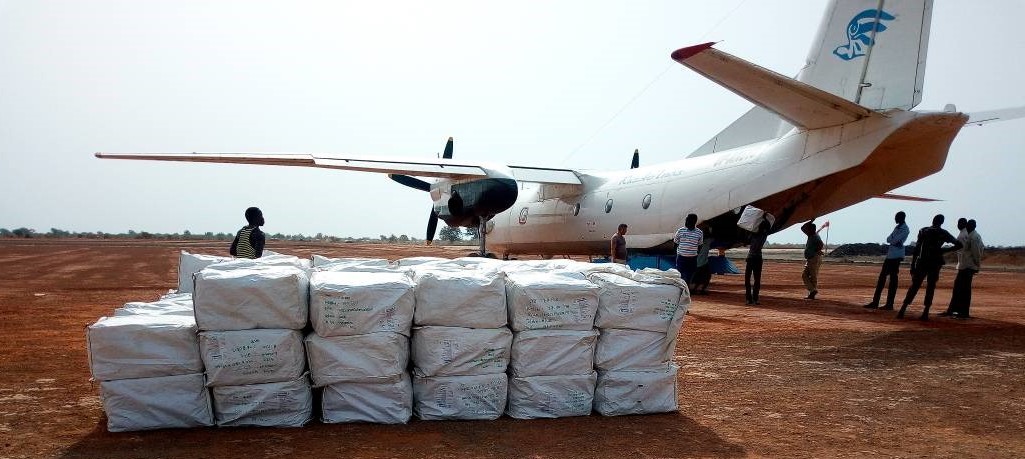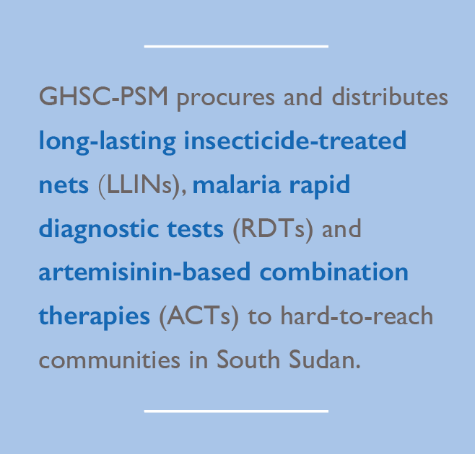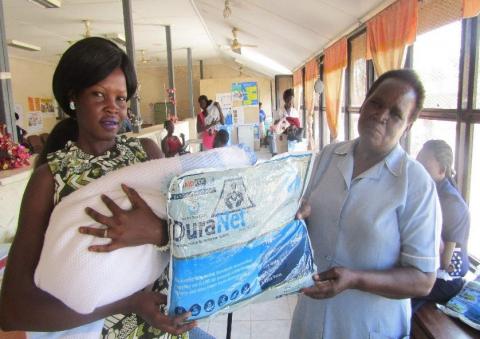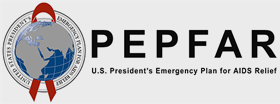To address the lack of a functioning logistics management information system (LMIS) and data collection challenges in South Sudan, GHSC-PSM opened a Juba-based call center based on private-sector models in 2018. The call center uses sophisticated information technology equipment including client servers, cloud technology, and cellphone networks to form an integrated auditable system.
The call center staff is small but responsive, regularly and proactively collecting inventory data on malaria pharmaceuticals and long-lasting insecticide-treated nets (LLINs), from county health departments (CHDs) and hospitals that serve as intermediate distribution points. By creating a functionality where staff can place calls over the internet through a structured mechanism, the project is able to obtain critical visibility into stock levels and provide relevant authorities with opportunities to address stockouts.
Similarly, the lack of a fully functional central warehouse in South Sudan prevents full visibility into commodity deliveries from various donors. This makes it difficult to estimate consumption and to develop accurate forecasts. The call center data is shared among donors and partners to bridge this gap. Although data still contains a few imperfections, the quality is considerably more robust than what stakeholders and partners previously had access to.
GHSC-PSM and partners use the data to identify supply risks and act to address them, so communities have uninterrupted access to vital medicines. To verify the accuracy of the call center, GHSC-PSM project staff visited Juba-area facilities to validate actual stock counts against reported stock with Ministry staff. While visiting Juba Teaching Hospital in March 2019, GHSC-PSM staff spoke specifically with the Ministry of Health Malaria Coordinator and nurse officials to confirm the stock status in the facility compared to LLIN and malaria commodity distribution records. Through these visits, GHSC-PSM staff were able to conduct the first data validation exercises to back up data collected on the phone.
The call center helps fill gaps in the health care system and has demonstrated how low-cost options in the South Sudan context can improve distribution performance, efficiency, and increased accuracy in forecasting and supply planning through improved analysis. For stakeholders working in commodity procurement and distribution in South Sudan, this project is providing tangible data for the first time and allows GHSC-PSM and partners to collaborate to reduce supply risk. For example, in 2019, the call center data helped to inform the USAID-procured distribution plan development process for the mRDT and ACT distribution that began in December 2019.
Through creative thinking, GHSC-PSM is making a challenging situation in South Sudan easier. By applying low cost and practical solutions to data visibility and accountability, malaria commodity availability is improving for patients.

 Confirming the arrival of health commodity deliveries and collecting stock data from health facilities has, until 2017, been considered next to impossible.
Confirming the arrival of health commodity deliveries and collecting stock data from health facilities has, until 2017, been considered next to impossible.


